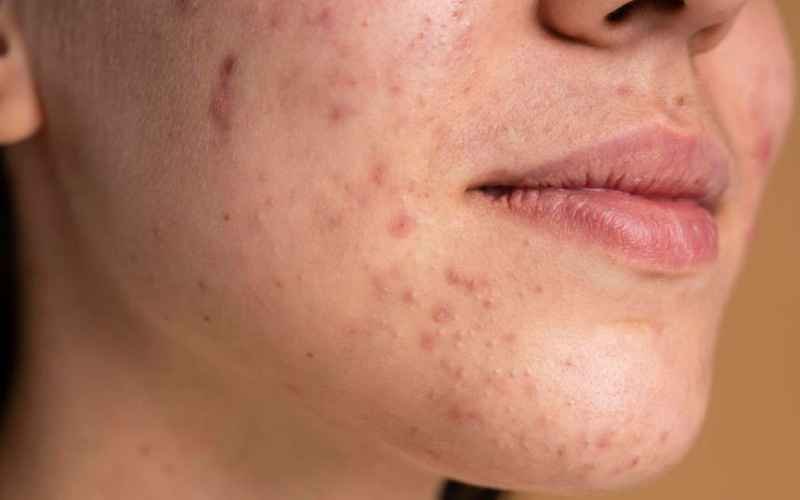Acne, the bane of many adolescents’ existence, often stubbornly persists into adulthood, causing frustration, self-consciousness, and even discomfort. Despite its prevalence, there remains much confusion surrounding acne, its causes, and effective treatments. In this blog, we’ll delve into the world of stubborn acne, shedding light on its causes, exploring treatment options, and discussing prevention strategies to help you achieve clearer, healthier skin.

Understanding Acne: Acne, a skin condition characterized by the formation of pimples, blackheads, whiteheads, and cysts, primarily affects areas rich in sebaceous glands, such as the face, neck, chest, shoulders, and back. Contrary to popular belief, acne isn’t solely a result of poor hygiene. Instead, it stems from a combination of factors, including:
- Excess Sebum Production: Sebum, an oily substance produced by the sebaceous glands, helps keep the skin moisturized. However, overproduction of sebum can lead to clogged pores and acne.
- Clogged Pores: When dead skin cells and excess sebum accumulate in hair follicles, they form plugs, leading to the development of comedones (blackheads and whiteheads).
- Bacterial Overgrowth: Propionibacterium acnes (P. acnes), a bacterium found on the skin, can proliferate in clogged pores, causing inflammation and acne lesions.
- Hormonal Fluctuations: Hormonal changes, such as those occurring during puberty, menstruation, pregnancy, or due to hormonal disorders, can trigger acne by increasing sebum production.
Treatment Options: Effective treatment of stubborn acne requires a multifaceted approach tailored to individual skin types and severity. Common treatment options include:
- Topical Treatments: Over-the-counter and prescription topical medications containing ingredients like benzoyl peroxide, salicylic acid, retinoids, or antibiotics can help unclog pores, reduce inflammation, and kill acne-causing bacteria.
- Oral Medications: In cases of severe or persistent acne, dermatologists may prescribe oral medications such as antibiotics, hormonal contraceptives (for females), or isotretinoin (Accutane) to address underlying causes and prevent future breakouts.
- Procedures: Dermatological procedures like chemical peels, microdermabrasion, laser therapy, or corticosteroid injections can be effective in treating stubborn acne and reducing scarring.
Prevention Strategies: While treating existing acne is essential, adopting preventive measures can help minimize breakouts and maintain clear skin. Here are some strategies to consider:
- Follow a Consistent Skincare Routine: Cleanse your skin twice daily with a gentle cleanser, avoid harsh scrubbing, and use non-comedogenic (non-pore-clogging) moisturizers and sunscreen.
- Watch Your Diet: Limit consumption of high-glycemic foods, dairy products, and sugary or greasy foods, as they may exacerbate acne. Instead, opt for a balanced diet rich in fruits, vegetables, whole grains, and lean proteins.
- Manage Stress: Stress can worsen acne by triggering hormonal changes. Practice stress-reduction techniques such as meditation, yoga, deep breathing exercises, or hobbies that promote relaxation.
- Avoid Picking or Popping Pimples: As tempting as it may be, picking or popping pimples can worsen inflammation, increase the risk of scarring, and spread bacteria, leading to more breakouts.
Conclusion: Stubborn acne can be a source of frustration and self-consciousness, but with the right knowledge and approach, it’s possible to achieve clearer, healthier skin. By understanding the underlying causes of acne, exploring effective treatment options, and implementing preventive strategies, you can take control of your skincare journey and say goodbye to stubborn breakouts for good. Remember, consistency and patience are key, so don’t hesitate to seek professional help from a dermatologist if needed. Here’s to clearer days ahead!
Top 20 frequently asked questions (FAQs) about demystifying stubborn acne
- What causes acne?
- Acne is primarily caused by a combination of factors, including excess sebum production, clogged pores, bacterial overgrowth, and hormonal fluctuations.
- Does poor hygiene cause acne?
- Poor hygiene alone doesn’t cause acne, but it can contribute to the buildup of dirt, oil, and bacteria on the skin, exacerbating existing acne.
- Can diet affect acne?
- Yes, certain foods with a high glycemic index, dairy products, and sugary or greasy foods may worsen acne for some individuals.
- How does stress impact acne?
- Stress can trigger hormonal changes that may exacerbate acne by increasing sebum production and inflammation.
- Are there different types of acne?
- Yes, acne can manifest in various forms, including blackheads, whiteheads, papules, pustules, nodules, and cysts.
- What are the best skincare products for acne-prone skin?
- Look for non-comedogenic products containing ingredients like benzoyl peroxide, salicylic acid, retinoids, or sulfur to help unclog pores and reduce acne.
- Is it safe to pop pimples?
- Popping pimples can worsen inflammation, increase the risk of scarring, and spread bacteria, so it’s best to avoid it.
- How can I prevent acne scars?
- Prevent acne scars by avoiding picking or popping pimples, treating acne early, and protecting your skin from sun exposure.
- Does makeup worsen acne?
- Some makeup products may exacerbate acne, especially if they contain pore-clogging ingredients. Look for non-comedogenic or oil-free formulations.
- Are there natural remedies for acne?
- Some natural remedies, such as tea tree oil, aloe vera, and green tea extract, may help reduce acne symptoms, but their effectiveness varies from person to person.
- Do hormonal fluctuations cause acne in adults?
- Yes, hormonal fluctuations, such as those during menstruation, pregnancy, or menopause, can trigger or exacerbate acne in adults.
- Can birth control pills help with acne?
- Hormonal contraceptives containing estrogen and progestin may help regulate hormonal fluctuations and reduce acne in some individuals.
- What is isotretinoin (Accutane), and how does it work?
- Isotretinoin is a powerful oral medication derived from vitamin A that reduces sebum production, unclogs pores, and prevents acne recurrence.
- Are there any side effects of acne medications?
- Yes, common side effects of acne medications include dryness, redness, peeling, and increased sensitivity to sunlight. Isotretinoin also carries potential risks of more severe side effects and requires close monitoring by a healthcare provider.
- Can acne be treated with laser therapy?
- Yes, laser therapy can help reduce acne by targeting bacteria, reducing inflammation, and promoting skin healing. Multiple sessions may be needed for optimal results.
- Is it possible to get rid of acne permanently?
- While acne can often be effectively managed and minimized, achieving complete and permanent clearance may be challenging for some individuals. Consistent skincare, lifestyle modifications, and professional treatments can help control acne long-term.
- How long does it take for acne treatments to work?
- The effectiveness of acne treatments varies from person to person. Some may see improvement within a few weeks, while others may require several months of consistent treatment before noticing significant results.
- Can acne come back after treatment?
- Yes, acne can recur even after successful treatment. Maintenance therapy and continued skincare practices are essential to prevent future breakouts.
- Can acne be a sign of an underlying health condition?
- In some cases, acne may be associated with underlying hormonal imbalances, polycystic ovary syndrome (PCOS), or other medical conditions. Consulting a healthcare provider can help determine if further evaluation is needed.
- When should I see a dermatologist for acne?
- Consider seeing a dermatologist if over-the-counter treatments aren’t effective, if acne is severe or causing scarring, or if you’re experiencing emotional distress or low self-esteem due to acne. A dermatologist can provide personalized treatment recommendations and help manage stubborn acne effectively.
Register for My Upcoming Masterclass HERE
See You in the Live Masterclass
Sunil Chaudhary stands as a preeminent global Leading digital coach, boasting a diverse clientele hailing from over 50 nations. Renowned for his prowess as an exemplary SEO expert, business automation coach, and landing page authority, Chaudhary also holds the distinction of being esteemed as the finest business coach in India. Beyond technical domains, he imparts invaluable insights into mindset, success, and life skills, thus encompassing a holistic approach to mentorship.










